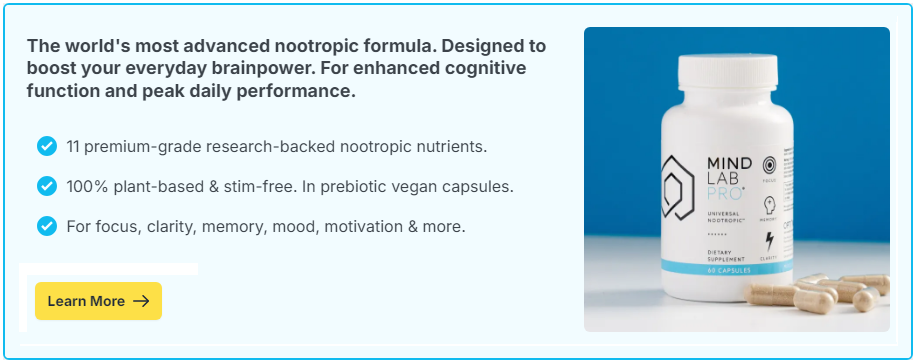
Medical professionals operate in an environment of constant learning and rapid advancements. With new research, technologies, and treatment protocols emerging daily, staying up-to-date is not just beneficial—it’s essential. However, the cognitive demands placed on healthcare professionals are immense. They must process vast amounts of information, make quick yet accurate decisions, and often work long shifts under stressful conditions.
For those seeking an edge in mental performance, nootropics—often referred to as “smart drugs” or cognitive enhancers—offer a compelling solution. These substances, whether natural or synthetic, are designed to improve memory, focus, mental clarity, and overall brain function. But can they really help medical professionals keep pace with the ever-evolving landscape of medicine? And if so, which nootropics are most effective?
Contents
The Cognitive Demands of Medical Professionals
Before examining how nootropics can help, it’s important to understand the unique mental challenges that medical professionals face daily.
Information Overload
New studies, treatment guidelines, and medical innovations are published at an overwhelming rate. Physicians, nurses, and researchers must continuously update their knowledge base while managing patient care, research, or clinical responsibilities.
High-Stakes Decision-Making
Medical professionals frequently make critical, life-altering decisions. Whether diagnosing a complex condition, prescribing the right treatment, or responding to an emergency, their cognitive abilities must be at peak performance at all times.
Long Hours and Fatigue
Many doctors and healthcare workers endure grueling 12-to-16-hour shifts, often on little sleep. Sleep deprivation can impair memory, problem-solving skills, and reaction times, making it more difficult to perform at the highest level.
Stress and Burnout
The pressure of medical practice can lead to chronic stress and burnout. Prolonged stress increases cortisol levels, which negatively affects focus, learning, and memory retention.
Given these challenges, many medical professionals seek ways to enhance their cognitive function, combat fatigue, and maintain mental resilience. This is where nootropics come into play.
What Are Nootropics?
Nootropics are substances that enhance brain function, often by improving memory, focus, mental clarity, and neuroprotection. They fall into two main categories:
- Natural nootropics: Plant-based compounds like ginseng, ginkgo biloba, and lion’s mane mushroom.
- Synthetic nootropics: Lab-created compounds such as modafinil, racetams, and noopept.
While some nootropics are prescription-based (e.g., modafinil, Adderall, and Ritalin for ADHD and narcolepsy), many over-the-counter options exist that provide cognitive benefits without significant side effects.
How Nootropics Enhance Cognitive Performance
The brain’s cognitive functions depend on neurotransmitters, blood flow, and neuroplasticity. Nootropics enhance these processes in various ways:
Improving Memory and Learning
Memory retention and recall are crucial for medical professionals who must remember vast amounts of medical literature, patient histories, and procedural steps. Certain nootropics support memory formation by boosting acetylcholine levels, a key neurotransmitter involved in learning and recall.
Enhancing Focus and Attention
Medical professionals must maintain high levels of concentration for extended periods, whether performing surgery, analyzing research, or making clinical decisions. Nootropics like caffeine, L-theanine, and modafinil help improve focus and sustained attention.
Reducing Mental Fatigue
Long hours and sleep deprivation can lead to mental exhaustion. Nootropics that support mitochondrial function, such as creatine and rhodiola rosea, help combat fatigue and improve cognitive endurance.
Boosting Neuroprotection
Some nootropics protect brain cells from oxidative stress and inflammation, helping preserve cognitive function over time. Antioxidant-rich substances like resveratrol and curcumin fall into this category.
Enhancing Mood and Reducing Stress
High stress levels can impair cognitive function. Adaptogenic nootropics such as ashwagandha and bacopa monnieri help regulate cortisol levels and improve resilience to stress.
Best Nootropics for Medical Professionals
Not all nootropics are created equal. The best choices for medical professionals should enhance cognition without causing significant side effects or dependency. Here are some of the most effective options:
Modafinil
A prescription nootropic originally developed to treat narcolepsy, modafinil is widely used for its wakefulness-promoting effects. It enhances focus, motivation, and cognitive endurance, making it a popular choice for professionals working long hours.
L-Theanine + Caffeine
The combination of L-theanine (found in green tea) and caffeine improves alertness while reducing jitteriness. This pairing provides smooth, sustained energy without the crash associated with coffee.
Bacopa Monnieri
Known for its memory-enhancing properties, bacopa monnieri is an adaptogen that reduces stress while improving recall and learning speed.
Rhodiola Rosea
Used for centuries as a natural fatigue-fighting remedy, rhodiola rosea enhances cognitive endurance and helps the brain adapt to stress.
Lion’s Mane Mushroom
This natural nootropic promotes nerve growth factor (NGF) production, supporting neuroplasticity, memory, and cognitive longevity.
Creatine
While often associated with physical performance, creatine also enhances cognitive function by providing additional energy to brain cells.
Potential Risks and Considerations
While nootropics can provide significant cognitive benefits, they are not without risks. Some important considerations include:
- Dependency and tolerance: Some synthetic nootropics, particularly stimulants, may lead to tolerance and dependency with long-term use.
- Side effects: Jitteriness, insomnia, headaches, and gastrointestinal discomfort are common with certain nootropics.
- Drug interactions: Some nootropics can interact with medications, making it important to consult a physician before use.
For medical professionals navigating a fast-paced and demanding field, nootropics offer a promising way to enhance cognitive performance, improve memory, and sustain mental stamina. Whether through natural adaptogens, amino acids, or prescription stimulants, the right cognitive enhancers can help healthcare workers keep up with the latest research and innovations while maintaining sharpness and clarity.
However, nootropics should be used responsibly and in conjunction with healthy lifestyle habits such as proper nutrition, exercise, and sufficient sleep. When used wisely, they can be a powerful tool in the arsenal of medical professionals striving for excellence in their field.

